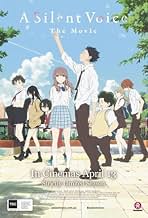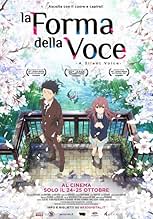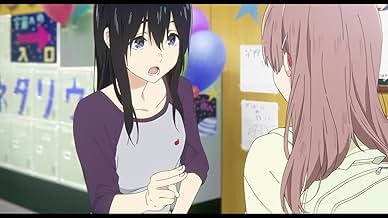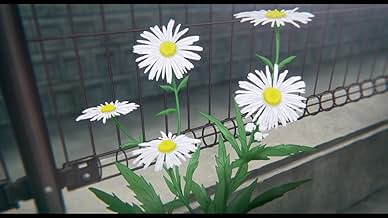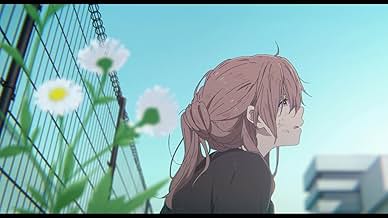Un jeune homme est ostracisé par ses camarades de classe après qu'il harcèle une jeune fille sourde au point qu'elle déménage. Des années plus tard, il s'engage sur le chemin de la rédemptio... Tout lireUn jeune homme est ostracisé par ses camarades de classe après qu'il harcèle une jeune fille sourde au point qu'elle déménage. Des années plus tard, il s'engage sur le chemin de la rédemption.Un jeune homme est ostracisé par ses camarades de classe après qu'il harcèle une jeune fille sourde au point qu'elle déménage. Des années plus tard, il s'engage sur le chemin de la rédemption.
- Prix
- 6 victoires et 9 nominations au total
Miyu Irino
- Shôya Ishida
- (voice)
Saori Hayami
- Shoko Nishimiya
- (voice)
Aoi Yûki
- Yuzuru Nishimiya
- (voice)
Kenshô Ono
- Tomohiro Nagatsuka
- (voice)
Yûki Kaneko
- Naoka Ueno
- (voice)
Yui Ishikawa
- Miyoko Sahara
- (voice)
Megumi Han
- Miki Kawai
- (voice)
Ikuko Tani
- Ito Nishimiya
- (voice)
Erena Kamata
- Maria Ishida
- (voice)
Ryûnosuke Watanuki
- Pedro
- (voice)
Ryô Nishitani
- Kazuki Shimada
- (voice)
Histoire
Le saviez-vous
- AnecdotesShoko's English dub voice actress Lexi Marman is actually deaf in real life.
- GaffesDuring Ishida and Ueno's conversation at the crosswalk, Nishimiya is seen holding the pouch that Ishida had given to her as a gift. However, it disappears after Ueno sprints across the street and removes Nishimiya's earpiece; it is nowhere to be seen on her person or on the ground.
- Citations
Miyoko Sahara: I couldn't change. I couldn't protect you again. I was the same coward.
Shoko Nishimiya: You can change from now on.
- Générique farfeluThough the official Roman-character title used on merchandise in Japan, and on the movie's posters, trailers, video boxes, video menus and so on in English-speaking countries is "A Silent Voice: The Movie" (often shortened to just "A Silent Voice"), the Roman-character title which appears on-screen in the full movie itself is instead "The Shape of Voice", which is an awkward mistranslation into English of "Koe no katachi".
- ConnexionsFeatured in MsMojo: Top 10 Saddest Anime Movies (2019)
Commentaire en vedette
There's nothing more cruel and twisted than a bully destroying the life of an innocent, just because of how different they are to everyone else. Having, well had, a deaf family member allowed this tragic high school drama to shroud me in a wave of familiarity. Not necessarily due to the absence of a human sense and how to deal with it, but the actions of bullying that I myself may have delivered to others at a naively young age.
Yamada and Kyoto Animation have produced one of the finest modern anime features in the last decade, enough to make me realise my erroneous judgements and how they have affected my so-called friends at the time. After nearly committing suicide, Shoya reflects back to his elementary school days where he bullied a young Shoko for her deafness. Having realised his insensitive approach, he attempts to make amends by befriending her and apologising.
This review may get personal, apologies in advance. Watching bullying makes me physically wretch. No one should be afflicted with that much pain and solidarity for being themselves. I've realised that for so long, believe me, as I myself was a bully. I even contacted my "friend" a few years ago to apologise profusely. But quite rightly, I received no response. Just an indication that it had been "read". In this story, Shoya represents me. So to witness the first act, whilst shedding a few tears almost instantly, was a hard-hitting yet tantalisingly emotional experience. The verbal, physical and downright inhumane abuse that Shoko received was enough to make me look away.
Overwhelmed with tainted reminiscence, Yoshida does not shy away from the original manga's poignant message. Transforming a grotesque bully into the sympathetic protagonist was always going to be tough. The audience has to feel his weakened mentality and earnest personality into wanting to right the wrongs he caused. Yoshida wrote every single character with a colossal amount of humanity. Never did it feel artificial, his longing for redemption. Never did it exhume desperation, the suicidal tendencies for the sake of melodrama. Never did it feel forced, the tangible romance blossoming between Shoya and Shoko. Beautifully written, gorgeously realised and touchingly human. The medium of anime rarely exceeds this level of writing. The sheer realism embedded within the animation made me weep tears atleast four times. Heck, I'm getting emotional just writing about the film! God damn!
Kyoto Animation have really outdone themselves in terms of capitalising on the source material's drawing style. Simply put, the animation was stunning. Faultless. From the majestic urban backdrop amidst a fireworks show, metaphorically symbolising the explosive fluctuating nature of mental instability, to the wonderfully drawn character models that expressively exhume a variety of emotions. Yamada intricately orchestrated the animation to create a frenetic narrative structure, complete with time shifts and illusory visions, alluding to the haphazard thinking during times of solitude. Arguably too frantic at the best of times, especially with abrupt scene transitions, but overall very well edited by Shigemura who utilises ripples to explore the vibrational impact of character actions.
The outstanding cinematography that creatively harnessed human body parts to reveal feelings, most notably legs, was memorable to say the least. Absolutely stunning. Intuitive details, for example implanting crosses on the faces of school peers that Shoya is outcasted by, further explored this idea of solitude. And rest assured, Yoshida never ventured into unnecessary melodrama. At no point did I feel forced to like Shoya, just because he wanted to walk down the path of redemption. It was all natural progression. The romance that carefully grows between Shoya and Shoko was exceptionally-well executed. The conclusion could've been cut tighter after the coma, however the film primarily revolved around Shoya as a character-changing venture, it was only fair the ending focused on him too. Oh, and the English dub wasn't irritating! Initially I had qualms with the deafened voice of Shoko, and aside from the crying, it was handled with earnest care.
The same can be said for the entirety of this anime feature. No matter if the story is relatable to the viewer or not, it is irrefutably beautiful. You will laugh. You will smile. And yes, you will cry. It's a journey that expressively explored every emotion available, and I can safely say it's a near-masterpiece.
Yamada and Kyoto Animation have produced one of the finest modern anime features in the last decade, enough to make me realise my erroneous judgements and how they have affected my so-called friends at the time. After nearly committing suicide, Shoya reflects back to his elementary school days where he bullied a young Shoko for her deafness. Having realised his insensitive approach, he attempts to make amends by befriending her and apologising.
This review may get personal, apologies in advance. Watching bullying makes me physically wretch. No one should be afflicted with that much pain and solidarity for being themselves. I've realised that for so long, believe me, as I myself was a bully. I even contacted my "friend" a few years ago to apologise profusely. But quite rightly, I received no response. Just an indication that it had been "read". In this story, Shoya represents me. So to witness the first act, whilst shedding a few tears almost instantly, was a hard-hitting yet tantalisingly emotional experience. The verbal, physical and downright inhumane abuse that Shoko received was enough to make me look away.
Overwhelmed with tainted reminiscence, Yoshida does not shy away from the original manga's poignant message. Transforming a grotesque bully into the sympathetic protagonist was always going to be tough. The audience has to feel his weakened mentality and earnest personality into wanting to right the wrongs he caused. Yoshida wrote every single character with a colossal amount of humanity. Never did it feel artificial, his longing for redemption. Never did it exhume desperation, the suicidal tendencies for the sake of melodrama. Never did it feel forced, the tangible romance blossoming between Shoya and Shoko. Beautifully written, gorgeously realised and touchingly human. The medium of anime rarely exceeds this level of writing. The sheer realism embedded within the animation made me weep tears atleast four times. Heck, I'm getting emotional just writing about the film! God damn!
Kyoto Animation have really outdone themselves in terms of capitalising on the source material's drawing style. Simply put, the animation was stunning. Faultless. From the majestic urban backdrop amidst a fireworks show, metaphorically symbolising the explosive fluctuating nature of mental instability, to the wonderfully drawn character models that expressively exhume a variety of emotions. Yamada intricately orchestrated the animation to create a frenetic narrative structure, complete with time shifts and illusory visions, alluding to the haphazard thinking during times of solitude. Arguably too frantic at the best of times, especially with abrupt scene transitions, but overall very well edited by Shigemura who utilises ripples to explore the vibrational impact of character actions.
The outstanding cinematography that creatively harnessed human body parts to reveal feelings, most notably legs, was memorable to say the least. Absolutely stunning. Intuitive details, for example implanting crosses on the faces of school peers that Shoya is outcasted by, further explored this idea of solitude. And rest assured, Yoshida never ventured into unnecessary melodrama. At no point did I feel forced to like Shoya, just because he wanted to walk down the path of redemption. It was all natural progression. The romance that carefully grows between Shoya and Shoko was exceptionally-well executed. The conclusion could've been cut tighter after the coma, however the film primarily revolved around Shoya as a character-changing venture, it was only fair the ending focused on him too. Oh, and the English dub wasn't irritating! Initially I had qualms with the deafened voice of Shoko, and aside from the crying, it was handled with earnest care.
The same can be said for the entirety of this anime feature. No matter if the story is relatable to the viewer or not, it is irrefutably beautiful. You will laugh. You will smile. And yes, you will cry. It's a journey that expressively explored every emotion available, and I can safely say it's a near-masterpiece.
- TheMovieDiorama
- 3 août 2019
- Lien permanent
Meilleurs choix
Connectez-vous pour évaluer et surveiller les recommandations personnalisées
Détails
- Date de sortie
- Pays d’origine
- Sites officiels
- Langues
- Aussi connu sous le nom de
- A Silent Voice
- sociétés de production
- Consultez plus de crédits d'entreprise sur IMDbPro
Box-office
- Brut – États-Unis et Canada
- 1 079 689 $ US
- Fin de semaine d'ouverture – États-Unis et Canada
- 121 732 $ US
- 22 oct. 2017
- Brut – à l'échelle mondiale
- 30 819 442 $ US
- Durée2 heures 10 minutes
- Couleur
- Mixage
- Rapport de forme
- 1.85 : 1
Contribuer à cette page
Suggérer une modification ou ajouter du contenu manquant



